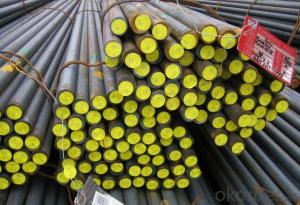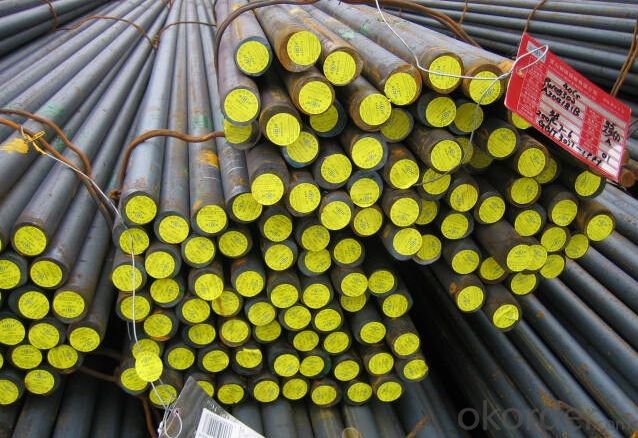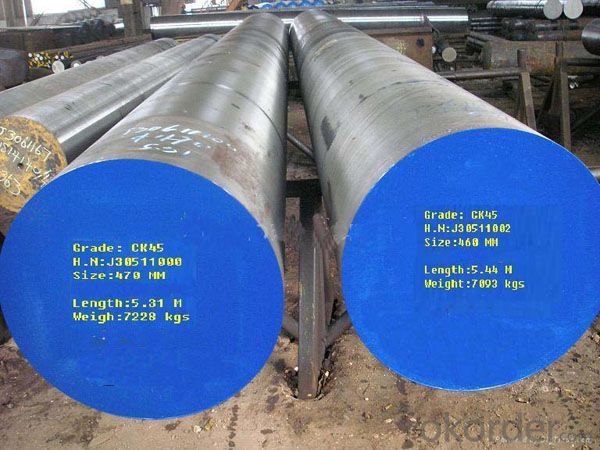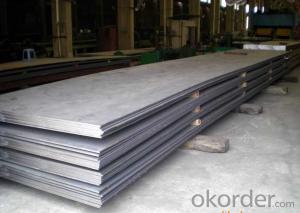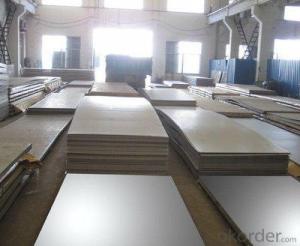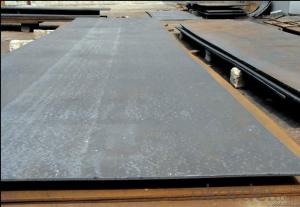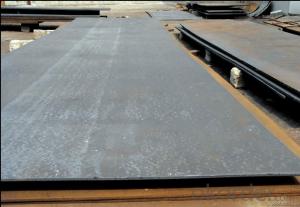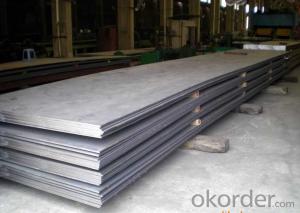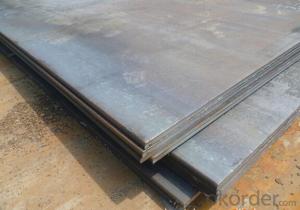K340/DC53 High Toughness Alloy Steel Plate
- Loading Port:
- China main port
- Payment Terms:
- TT OR LC
- Min Order Qty:
- 25 m.t.
- Supply Capability:
- 10000 m.t./month
OKorder Service Pledge
OKorder Financial Service
You Might Also Like
Specification
Chemical Composition(%)
| C | Si | Mn | Cr | Mo | V | S | P |
| 1.00 | 1.00 | 0.35 | 8.00 | 2.00 | 0.25 | ≤0.030 | ≤0.030 |
Available Size
Rolled flat steel :12-90mm × 205-610mm × L
Heat Treatment
| Item | Temperature ℃ | Hardness |
| Anneal | 820-840 | ≤241HB |
| Quenching | 1020-1040 | 62-65 |
| Tempering | No.1:180-200 | 60-62 |
| No.2:500-550(2) | 60-63 |
Characterstics
| 1.High toughness and abrasion resistance steel | |||||||
| 2.High hardening ability | |||||||
| 3.Less quenching deformation | |||||||
| 4.Higher toughness and more homogeneous carbide distribution than D2 steel |
Applications: Suitable for cold shearing dies,cutting dies,trimming dies,measuring gauges,wire-drawing dies,screw plates,cold punching dies,etc


1, Your advantages?
professional products inquiry, products knowledge train (for agents), smooth goods delivery, excellent customer solution proposale
2, Test & Certificate?
SGS test is available, customer inspection before shipping is welcome, third party inspection is no problem
3, Payment Terms?
30% TT as deposit and 70% before delivery.
Irrevocable L/C at sight.
4, Trading Terms?
EXW, FOB, CIF, FFR, CNF
6, After-sale Service?
We provides the services and support you need for every step of our cooperation. We're the business partner you can trust.
For any problem, please kindly contact us at any your convenient time.
We'll reply you in our first priority within 24 hours.
- Q: What are the specific requirements for special steel used in the textile machinery industry?
- The special steel requirements for the textile machinery industry can differ based on the specific application and machinery involved. Nevertheless, there are several common requirements in this industry. Firstly, corrosion resistance is crucial as textile machinery is frequently exposed to moisture, chemicals, and other corrosive substances. Therefore, the special steel used must possess excellent corrosion resistance properties to ensure durability and longevity. Secondly, high strength is necessary since textile machinery operates under high loads and stresses. Consequently, the special steel employed must have strong characteristics to withstand these forces and prevent deformation or failure. Furthermore, wear resistance is important as textile machinery involves constant contact between different components, leading to wear and tear. Thus, the special steel utilized should exhibit good wear resistance properties to minimize friction and extend the machinery's lifespan. Additionally, heat resistance is vital as textile machinery often operates at high temperatures due to friction generated during the manufacturing process. Consequently, the special steel used should possess exceptional heat resistance to prevent deformation or loss of mechanical properties under high temperature conditions. Moreover, machinability is necessary for the special steel used in the textile machinery industry. This allows for the production of complex components with precise dimensions, ensuring smooth and efficient machinery operation. Lastly, cost-effectiveness is crucial while meeting all the aforementioned requirements. Manufacturers strive to balance performance and cost to maintain competitiveness in the market without compromising on quality. It is important to note that these requirements can vary depending on the specific application within the textile machinery industry. As a result, manufacturers and engineers must carefully evaluate their machinery's requirements and choose the appropriate special steel accordingly.
- Q: Can special steel be used in the electronics manufacturing industry?
- Yes, special steel can be used in the electronics manufacturing industry. Special steels, such as stainless steel and high-performance alloys, offer excellent corrosion resistance, high strength, and good heat resistance. These properties make them suitable for various applications in electronics manufacturing, including the production of circuit boards, connectors, and other electronic components.
- Q: What are the requirements for special steel used in military applications?
- Special steel used in military applications must meet certain requirements to ensure optimal performance and durability in the field. These requirements include: 1. High strength: Military applications often involve extreme conditions, such as heavy loads, impacts, and shocks. Special steel used in these applications must have high strength to withstand these forces without deformation or failure. 2. Toughness: The steel should have excellent toughness to resist cracking or fracturing under high-stress situations. This is crucial for ensuring the safety of military personnel and equipment. 3. Corrosion resistance: Military operations can take place in various environments, including marine or coastal areas where exposure to moisture, saltwater, and other corrosive elements is common. Special steel used in military applications should have good corrosion resistance to maintain its structural integrity over time. 4. Heat resistance: Military equipment often encounters high temperatures due to friction, combustion, or exposure to explosives. The steel used must have good heat resistance to prevent deformation or loss of strength under these conditions. 5. Wear resistance: Military equipment is subject to frequent use, abrasive contact, and potential impact with foreign objects. Special steel used in these applications should have excellent wear resistance to minimize damage and prolong the lifespan of the equipment. 6. Machinability: Special steel used in military applications should be easy to machine and process into various shapes and sizes. This ensures that it can be tailored to specific requirements and easily integrated into different military systems. 7. Cost-effectiveness: While meeting all the above requirements, special steel used in military applications should also be cost-effective. The steel must offer a good balance between performance and cost to ensure efficient use of resources. By meeting these requirements, special steel used in military applications can provide the necessary strength, durability, and reliability needed for military operations, ensuring the safety and effectiveness of military personnel and equipment.
- Q: What are the main characteristics of pressure vessel steel?
- Pressure vessel steel is a specialized type of steel that is manufactured and designed to endure high-pressure environments. It possesses distinct properties that enable it to be suitable for such applications. To begin with, pressure vessel steel demonstrates exceptional strength and toughness. It can withstand the internal pressure exerted upon it without deforming or rupturing, thereby ensuring the security and integrity of the vessel. Achieving this high strength involves carefully alloying and heat treatment processes that enhance its mechanical properties. In addition, pressure vessel steel displays favorable weldability. This is crucial as pressure vessels often require the joining of various components. The capacity to weld the steel without compromising its structural integrity is imperative for fabricating and maintaining pressure vessels. Moreover, pressure vessel steel is renowned for its elevated corrosion resistance. Typically, the steel is alloyed with elements like chromium, molybdenum, and nickel, which provide a protective barrier against corrosive substances and environments. This plays a vital role in preventing the deterioration of the vessel and ensuring its long-term durability. Furthermore, pressure vessel steel possesses the ability to withstand a wide range of temperatures. It can maintain its strength and toughness even under extreme temperature conditions, rendering it suitable for applications where the vessel is exposed to high or low temperatures. Lastly, pressure vessel steel is subjected to stringent testing and quality control measures to guarantee its reliability and safety. It must meet specific standards and certifications, such as those established by organizations like the American Society of Mechanical Engineers (ASME), to be deemed suitable for pressure vessel applications. Overall, the primary characteristics of pressure vessel steel include high strength and toughness, favorable weldability, corrosion resistance, temperature resistance, and adherence to strict quality standards. These properties make it an ideal material for constructing pressure vessels, which find application in various industries such as oil and gas, chemical processing, and power generation.
- Q: How long does special steel last compared to regular steel?
- Special steel generally lasts longer than regular steel due to its unique composition and properties. Regular steel is made mostly of iron and carbon, whereas special steel is alloyed with other elements such as chromium, nickel, and molybdenum to enhance its strength, hardness, and corrosion resistance. The lifespan of special steel depends on various factors such as the specific type of steel, its usage conditions, and maintenance. However, in general, special steel can have a significantly longer lifespan compared to regular steel. It is more resistant to wear and tear, corrosion, and high temperatures, making it suitable for demanding applications and environments. For instance, in industries such as aerospace, automotive, and construction, special steel is widely used for critical components like engine parts, structural elements, and cutting tools. These components often experience high stress, friction, and exposure to harsh conditions. Special steel's superior properties enable it to withstand these challenges and maintain its performance over a longer period of time. Moreover, special steel is often subjected to rigorous testing and quality control measures during its manufacturing process. This ensures that it meets specific industry standards and can endure extreme conditions without significant degradation. Regular steel, on the other hand, may not possess the same level of durability or longevity. In summary, while the exact lifespan of special steel compared to regular steel can vary depending on various factors, special steel generally lasts longer due to its enhanced properties and resistance to wear, corrosion, and high temperatures.
- Q: Can special steel be used in the rubber manufacturing industry?
- Yes, special steel can be used in the rubber manufacturing industry. Special steel can be utilized in the production of various rubber processing equipment, such as molds, dies, and machinery parts, due to its high strength, durability, and resistance to wear and tear.
- Q: How does special steel perform in terms of electrical conductivity?
- Special steel generally has low electrical conductivity compared to other metals such as copper or aluminum. This is due to the high carbon content and other alloying elements present in special steel, which impede the flow of electric current. However, certain types of special steel, such as stainless steel, can exhibit better electrical conductivity when compared to regular carbon steel.
- Q: How does special steel contribute to the power transmission sector?
- Special steel plays a crucial role in the power transmission sector by offering enhanced strength, durability, and corrosion resistance. It is used to manufacture various components like gears, shafts, bearings, and turbines, which are essential for transmitting power efficiently and reliably. The exceptional properties of special steel ensure that these components can withstand high loads, extreme temperatures, and harsh operating conditions, thus contributing to the overall efficiency and reliability of power transmission systems.
- Q: How does special steel contribute to the strength of structures?
- Special steel contributes to the strength of structures by providing enhanced properties such as high tensile strength, durability, and resistance to corrosion. This type of steel is specifically engineered to withstand heavy loads, extreme conditions, and harsh environments. Its superior strength allows for the construction of structures that can support more weight, withstand greater pressures, and resist deformation. Whether used in buildings, bridges, or machinery, special steel plays a vital role in ensuring the structural integrity and longevity of various constructions.
- Q: Can special steel be used in the production of musical instruments?
- Yes, special steel can be used in the production of musical instruments. Special steel, also known as tool steel or high-performance steel, is a type of steel that has been specifically designed to possess certain properties that make it suitable for specific applications. These properties include high strength, durability, and resistance to wear and corrosion. In the case of musical instruments, special steel can be used in various components, such as strings, springs, keys, valves, and reeds. For example, piano strings are typically made from high-carbon steel, which provides the necessary strength and elasticity for producing the desired sound. Brass instruments like trumpets or saxophones have valves made from special steel alloys that have excellent corrosion resistance and can withstand the repetitive movements required for playing the instrument. In addition, special steel can also be used in the manufacturing of instrument parts like guitar frets. Frets are metal strips embedded along the fingerboard of a guitar, and they need to be made from a material that is durable, wear-resistant, and able to hold its shape over time. Special steel alloys, such as stainless steel or nickel-silver, are commonly used for this purpose. Overall, special steel offers a range of properties that can enhance the performance and longevity of musical instruments. By using this type of steel, manufacturers can create instruments that produce high-quality sound, are more resistant to wear and tear, and have a longer lifespan.
Send your message to us
K340/DC53 High Toughness Alloy Steel Plate
- Loading Port:
- China main port
- Payment Terms:
- TT OR LC
- Min Order Qty:
- 25 m.t.
- Supply Capability:
- 10000 m.t./month
OKorder Service Pledge
OKorder Financial Service
Similar products
Hot products
Hot Searches
Related keywords
